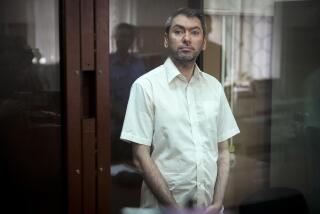Sakharov Meets Gorbachev on Rights Issue
- Share via
MOSCOW — Activist Andrei D. Sakharov met Soviet leader Mikhail S. Gorbachev on Friday and asked him to free about 200 prisoners he said are being held because of their beliefs.
Sakharov, who in 1975 was awarded the Nobel Peace Prize, handed Gorbachev a list of the prisoners’ names at a Kremlin meeting in connection with the formation of a new organization called the International Foundation for the Survival of Humanity.
Gorbachev made no comment on the list. It was his first personal meeting with Sakharov. About a year ago, they talked by telephone when Gorbachev advised him of his release from “internal exile” in the city of Gorky.
Sakharov, 66, a noted physicist who became an important figure in the Soviet human rights movement in the 1970s, continues to speak out on behalf of nonconformists who get into trouble with the authorities.
Gorbachev ordered the release of about 180 people from prisons early last year, but Sakharov and others contend that more than that number are still in custody because of their political or religious beliefs.
Armand Hammer, the American industrialist, attended the three-hour meeting along with about two dozen other people at the Kremlin on Friday and later met privately with Gorbachev. It was Hammer who told reporters about Sakharov’s list.
Sakharov’s Opinions ‘Respected’
“Mr. Gorbachev was very considerate of Mr. Sakharov and listened patiently,” Hammer said. “I could see that he respected Sakharov’s opinions when Sakharov brought up the question of the prisoners that he thought should be freed.”
Sakharov, in a news conference at the Foreign Ministry’s press center, was effusive about his meeting with Gorbachev but declined to say what they talked about.
“He is a man open to discussion, able to understand and listen,” he said. “I have a high opinion of Gorbachev as a government official and in personal terms.”
Sakharov’s presence at the Kremlin was in sharp contrast with the humiliation he endured in 1980, when he was stripped of state honors and sent into internal exile, without trial, for criticizing the Soviet invasion of Afghanistan.
Now, Gorbachev has shifted Kremlin policy in favor of withdrawing by the end of the year the estimated 115,000 Soviet troops deployed there.
Afghan Pullout Reaffirmed
Hammer, who met for 30 minutes with Gorbachev, said the Soviet leader reaffirmed his intention to pull the Soviet troops out of Afghanistan.
“He told me,” Hammer said, “that I could carry the message back to America that he was very determined and sincere, and this had been decided politically, and it was now just a matter of the mechanism, working it out. . . . He said he did not want to see a bloodbath in Afghanistan after the Russians left.”
Hammer quoted Gorbachev as saying the Reagan Administration has said it wants to be helpful in Afghanistan.
“Mr. Gorbachev is very realistic,” he went on. “. . . . He knows that Russian troops have to be withdrawn and the Afghan people have to decide for themselves what kind of government they want to have.”
Even as Hammer was talking, Sakharov was renewing his appeal for immediate withdrawal of the Soviet troops, a position he reaffirmed in Moscow in late 1986 upon his release from Gorky.
Free of Harassment
Since then, Sakharov has been free of official harassment. He has been permitted to resume his research at the Academy of Sciences and has even had his views printed in the Moscow News, an official weekly circulated primarily among foreigners.
His appearance at the Foreign Ministry’s press center, another first for him, came in connection with his membership on the board of directors of the International Foundation for the Survival of Humanity. The foundation, with Soviet, U.S. and European members, will make grants for innovative projects to solve world problems, according to its founders.
Its headquarters will be in Moscow, with other offices in Stockholm and Washington. The fund’s staff will be headed by Rolf Bjornerstedt of Sweden, with physicist Yevgeny B. Velikhov of the Soviet Academy of Sciences and Jerome B. Wiesner, former president of the Massachusetts Institute of Technology, as deputy directors.
Sakharov will be one of six Soviet board members. Hammer, who gave $1 million to the foundation, will be one of the seven American board members.
More to Read
Sign up for Essential California
The most important California stories and recommendations in your inbox every morning.
You may occasionally receive promotional content from the Los Angeles Times.













